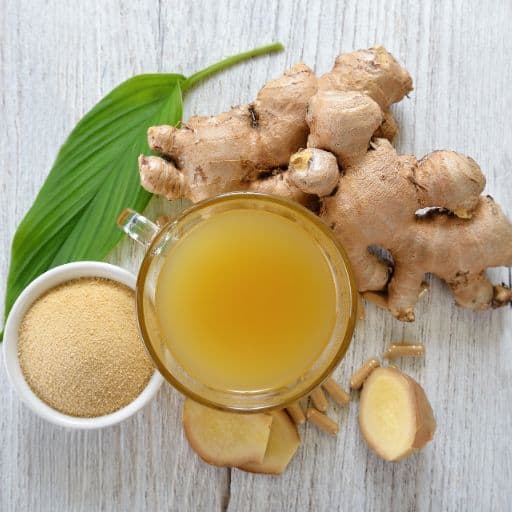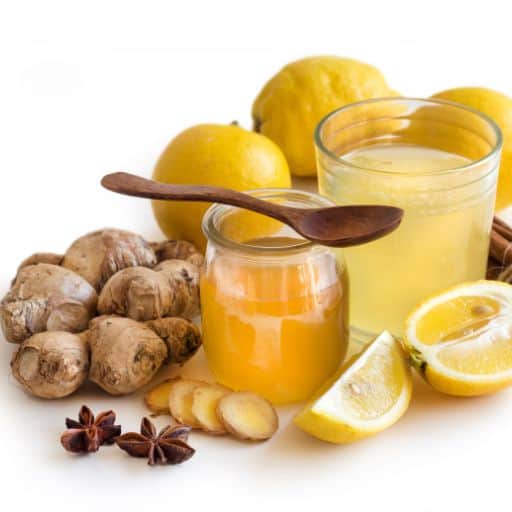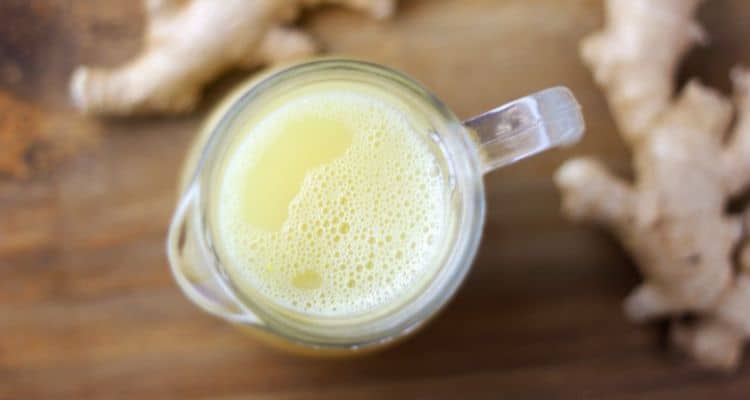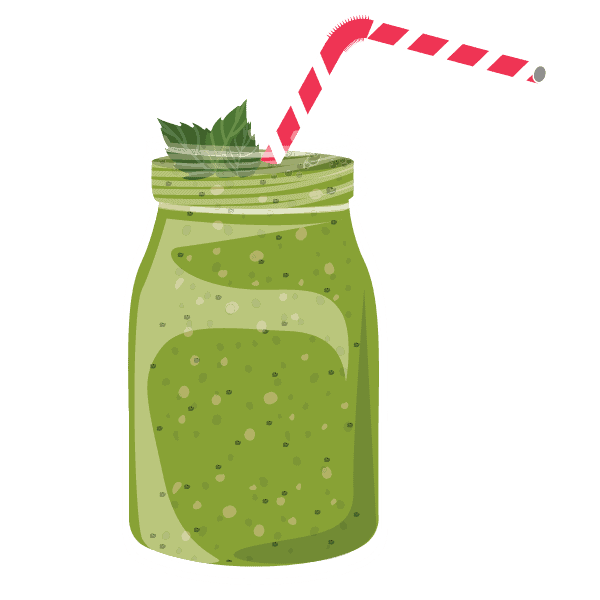Are you looking for a natural way to improve your health? Ginger juice could be the answer. Made by extracting juice from fresh ginger root, this popular health drink has been used for centuries in traditional medicine. But what is ginger juice good for, exactly?
The benefits of ginger juice are numerous. Regular consumption can aid digestion, reduce inflammation, and even boost your immune system. Ginger supplements have alleviated nausea and vomiting caused by chemotherapy or pregnancy.
If you want to improve your overall health and well-being, incorporating ginger juice into your diet may be just what you need.
What is Ginger Juice Good For?

Reduces Inflammation in the Body
Ginger contains compounds called gingerols and shogaols that have potent anti-inflammatory properties. Chronic inflammation can weaken the immune system and make you more susceptible to infections and illnesses.
Drinking ginger juice regularly can help reduce inflammation throughout the body, which may help alleviate symptoms of conditions such as arthritis, asthma, and even certain types of cancer.
Aids Digestion and Relieves Gastrointestinal Issues
Ginger has been used for centuries to aid digestion and relieve gastrointestinal issues such as nausea, vomiting, and indigestion. Ginger juice can stimulate digestion by increasing the production of digestive juices and enzymes. It also has a calming effect on the stomach muscles, which can help relieve nausea.
Boosts the Immune System
Drinking ginger juice regularly can also boost your immune system. Ginger contains high levels of antioxidants that protect against cell damage caused by free radicals. It also has antimicrobial properties that may help fight off infections.
Lemon-Ginger Shots for Immunity Boost

One popular way to consume ginger juice is by taking lemon-ginger shots. These shots combine the immune-boosting properties of both ginger and lemon for a powerful health drink. To make a lemon-ginger shot at home, blend fresh ginger with lemon juice in your favorite juicer.
Has Antioxidant Properties That Protect Against Cell Damage
Ginger juice contains high concentrations of antioxidants, which help strengthen the immune system. Antioxidants are compounds that neutralize harmful free radicals in the body, preventing them from damaging cells and tissues. By regularly consuming ginger shots, you can provide your body with a steady supply of antioxidants to fight infections and diseases.
This makes it an excellent natural remedy for preventing chronic diseases such as heart disease, diabetes, and cancer.
Gingerols in Ginger Root Inhibit Tumor Growth
Ginger root contains compounds called gingerols that have been shown to prevent the growth and spread of cancer cells. These compounds block pathways promoting tumor growth, slowing or stopping their progression.
Studies have found ginger juice can effectively reduce the risk of ovarian, colon, and gastrointestinal cancers. A cup or shot of ginger juice a day may help keep these types of cancers at bay.
May Help Lower Blood Pressure and Cholesterol Levels
High blood pressure and cholesterol levels are major risk factors for heart disease. Studies have shown that fresh ginger or ginger extracts may help lower blood pressure and cholesterol levels.
Drinking ginger juice regularly may be an effective way to incorporate this powerful spice into your daily diet.
High cholesterol levels can increase the risk of heart disease, weight gain, high blood pressure, and blood clots. The cholesterol-lowering effects of ginger are attributed to its ability to inhibit certain enzymes involved in cholesterol synthesis.
A study published in the Saudi Medical Journal found that consuming 3 grams of powdered ginger daily for eight weeks significantly reduced total cholesterol levels in people with high cholesterol.
Weight Loss
In recent years, researchers have been investigating the potential of ginger to aid in weight loss and improve metabolic health.
A meta-analysis of randomized controlled trials has found that ginger supplementation can significantly decrease body weight, waist-to-hip ratio, fasting glucose levels, and insulin resistance index while increasing HDL-cholesterol levels.
The mechanism of action behind ginger’s potential weight loss benefits is not yet fully understood. However, some studies suggest ginger may increase thermogenesis or the body’s ability to burn calories and reduce inflammation associated with obesity and metabolic disorders.
Given these promising findings, adding ginger to one’s diet could be a simple and flavorful way to support weight loss and improve overall health.
Ease Menstrual Pain
Menstrual pain is a common problem that many women face every month. However, there are natural remedies available that can help ease the pain. One such remedy is ginger juice or warm ginger tea.
To make ginger tea, you will need fresh ginger root, warm water, honey, and lemon. Start by peeling and grating the ginger root. Then mix it with warm water and let it steep for a few minutes. Finally, add some honey and freshly squeezed lemon to taste.
Drinking this mixture can help ease menstrual pain and provide other health benefits, such as boosting your immune system and aiding digestion.
Research has shown that consuming one gram of powdered or raw ginger daily during your period can help reduce menstrual pain compared to those without.
Tea bags containing ginger are available in stores, making it easy to enjoy the benefits of ginger daily without having to prepare it yourself or go ahead and make a ginger shot.
Ginger Juice for Bad Breath

Another benefit of consuming ginger juice is its ability to combat bad breath. The compounds found in ginger have natural antibacterial properties that can help kill odor-causing bacteria in the mouth. Drinking ginger after meals can help freshen your breath and improve oral hygiene.
Headaches and Migraine Relief
Ginger juice can also relieve headaches and migraines due to its anti-inflammatory effects. It helps reduce the swelling in blood vessels that can cause headaches, making it an effective natural remedy.
Ginger is used in Ayurvedic medicine to treat neurological disorders, as confirmed in this article published in the Journal of Ethnopharmacology. A human trial in 2011 showed that 63% of subjects gained relief from taking a sublingual ginger supplement during the pre-migraine headache phase.
Regulating Blood Sugar Levels
Ginger is a root that contains bioactive compounds, including gingerols and shogaols. These compounds have been found to have anti-diabetic properties, making ginger juice an effective natural remedy for regulating blood sugar levels.
Research has shown that consuming ginger juice regularly may help regulate blood sugar in people with diabetes or insulin resistance. A study published in the Iranian Journal of Pharmaceutical Research found that consuming 2 grams of ginger powder daily for 12 weeks significantly reduced fasting blood sugar levels in people with type 2 diabetes.
Alleviating Nausea
Ginger juice is a natural remedy for nausea caused by various reasons, such as motion sickness, morning sickness during pregnancy, or chemotherapy-induced nausea. The gingerol present in ginger has anti-inflammatory properties that help reduce the inflammation in the stomach lining that causes nausea. Drinking a small amount of ginger juice can alleviate nausea symptoms effectively.
Soothing an Upset Stomach
Ginger juice has been used for centuries to soothe an upset stomach and promote digestion. Its anti-inflammatory properties help relieve bloating, gas, and indigestion. Ginger juice can also help stimulate the production of digestive juices that aid digestion.
Ginger and artichoke supplementation was used in a randomized trial for patients with functional dyspepsia with impressive results.
Preventing Bloating and Indigestion
Consuming small amounts of ginger before meals can prevent bloating, gas, and indigestion. Ginger tea or ginger juice can be consumed before meals to help prevent these issues from occurring.
Reduces Muscle Soreness and Joint Pain
The anti-inflammatory properties of ginger juice make it an excellent treatment for muscle soreness and joint pain. It can be especially helpful after exercise or physical activity when muscles may be inflamed due to micro-tears.
Risks and Side Effects of Ginger Juice:

Digestive Issues:
Ginger is known to have a warming effect on the body, which can stimulate digestion. However, consuming large amounts of ginger juice may cause digestive issues such as diarrhea or stomach upset. This is because ginger contains compounds that can irritate the digestive tract if consumed excessively.
Blood-thinning Medications:
People taking blood-thinning medications should consult their doctor before consuming ginger juice. This is because ginger has natural blood-thinning properties that can increase bleeding risk when combined with certain medications. If you are taking blood thinners, speaking with a healthcare provider before adding ginger juice to your diet is important.
How to Use Ginger Juice for Pain Relief
There are several ways to use ginger juice for pain relief:
- Drink fresh ginger juice: Process fresh ginger root through your juicer. Drink on its own or blended with other fruits and vegetables.
- Apply ginger poultice: Mix grated ginger with hot water to form a paste. Apply the paste to the affected area using a cloth or bandage.
- Use powdered ginger or supplements: Add powdered ginger to your food or drink for added benefits.
- Use as massage oil: Mix fresh ginger juice with a carrier oil like coconut or olive oil and apply it topically on painful areas.
Can I drink ginger juice every day?
Yes, you can drink ginger juice every day in moderation. However, it’s important not to consume too much as it may cause adverse effects.
Is it safe to drink ginger juice during pregnancy?
Studies have shown ginger helped alleviate nausea in the first trimester of pregnancy. As always, consult with your healthcare provided for advice tailored to your circumstances, especially if you have a history of miscarriage, vaginal bleeding, or clotting disorders,
How long does homemade ginger juice last?
Fresh ginger juice is best consumed immediately. If you need to store leftovers, place it in an airtight container in the fridge for up to 3 days.
Can I store ginger juice in the freezer?
You can store ginger juice in the freezer for up to three months. However, it’s best to consume it fresh for maximum benefits.
What does ginger juice taste like?
Spicy! Ginger is strong and bitey. If you have never had fresh ginger juice before, try adding it to other juices or diluting it with water before drinking it on its own.
Conclusion
Ginger juice is a powerful beverage with numerous health benefits. It can help improve immune function, lower blood sugar and cholesterol levels, relieve nausea and upset stomach, ease menstrual pain, provide pain relief with anti-inflammatory properties, and reduce cancer risk.
However, it’s important to note that consuming too much ginger juice can lead to risks and side effects such as heartburn and diarrhea.
If you’re looking for a natural way to boost your health, consider adding ginger juice to your diet. It’s easy to make at home using fresh ginger root and a juicer. .
Always consult your healthcare provider before making any significant changes to your diet or lifestyle.
Citations:
Fakhri S, Patra JK, Das SK, Das G, Majnooni MB, Farzaei MH. Ginger and Heart Health: From Mechanisms to Therapeutics. Curr Mol Pharmacol. 2021;14(6):943-959. doi: 10.2174/1874467213666201209105005. PMID: 33297926.
Maharlouei N, Tabrizi R, Lankarani KB, Rezaianzadeh A, Akbari M, Kolahdooz F, Rahimi M, Keneshlou F, Asemi Z. The effects of ginger intake on weight loss and metabolic profiles among overweight and obese subjects: A systematic review and meta-analysis of randomized controlled trials. Crit Rev Food Sci Nutr. 2019;59(11):1753-1766. doi: 10.1080/10408398.2018.1427044. Epub 2018 Feb 2. PMID: 29393665.
Mustafa T, Srivastava KC. Ginger (Zingiber officinale) in migraine headache. J Ethnopharmacol. 1990 Jul;29(3):267-73. doi: 10.1016/0378-8741(90)90037-t. PMID: 2214812.
Cady RK, Goldstein J, Nett R, Mitchell R, Beach ME, Browning R. A double-blind placebo-controlled pilot study of sublingual feverfew and ginger (LipiGesic™ M) in the treatment of migraine. Headache. 2011 Jul-Aug;51(7):1078-86. doi: 10.1111/j.1526-4610.2011.01910.x. Epub 2011 Jun 1. PMID: 21631494.
Khandouzi N, Shidfar F, Rajab A, Rahideh T, Hosseini P, Mir Taheri M. The effects of ginger on fasting blood sugar, hemoglobin a1c, apolipoprotein B, apolipoprotein a-I and malondialdehyde in type 2 diabetic patients. Iran J Pharm Res. 2015 Winter;14(1):131-40. PMID: 25561919; PMCID: PMC4277626.
Giacosa A, Guido D, Grassi M, Riva A, Morazzoni P, Bombardelli E, Perna S, Faliva MA, Rondanelli M. The Effect of Ginger (Zingiber officinalis) and Artichoke (Cynara cardunculus) Extract Supplementation on Functional Dyspepsia: A Randomised, Double-Blind, and Placebo-Controlled Clinical Trial. Evid Based Complement Alternat Med. 2015;2015:915087. doi: 10.1155/2015/915087. Epub 2015 Apr 14. PMID: 25954317; PMCID: PMC4411465.
Jeong CH, Bode AM, Pugliese A, Cho YY, Kim HG, Shim JH, Jeon YJ, Li H, Jiang H, Dong Z. [6]-Gingerol suppresses colon cancer growth by targeting leukotriene A4 hydrolase. Cancer Res. 2009 Jul 1;69(13):5584-91. doi: 10.1158/0008-5472.CAN-09-0491. Epub 2009 Jun 16. PMID: 19531649.
Prasad S, Tyagi AK. Ginger and its constituents: role in prevention and treatment of gastrointestinal cancer. Gastroenterol Res Pract. 2015;2015:142979. doi: 10.1155/2015/142979. Epub 2015 Mar 8. PMID: 25838819; PMCID: PMC4369959.


